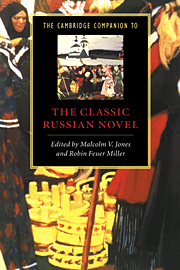14 - Theory
from Part 4 - Structures and readings
Published online by Cambridge University Press: 28 May 2006
Summary
In the nineteenth century, after decades of imitations, translations, and a tradition of bawdy native prose, Russia began to challenge the West as the home of the greatest novels ever written. Are Russian “theories of the novel” comparably rich? The current fame of Mikhail Bakhtin might suggest that this is indeed the case. But Bakhtin was a pioneer: he began work on the novel during the 1920s, with what he considered to be only scattered and unsatisfying critical precedent at his disposal. He repeatedly declared that the protean nature of this genre, its unsystematicity and generosity of form, had made the very question of an adequate theory of the novel awkward for any literary tradition. Since the novel outgrows every definition imposed upon it and can incorporate its own parody without ceasing to be itself, its formal study does not reward that drawing of boundaries upon which respectable theory rests.
For this reason, many discussions claiming to provide a “theory” or “morphology” of the novel in effect provide a history of novels. The literary historian devises a chronology of select novel-types (picaresque, sentimental, utopian, psychological), attaches it to larger literary periods, and then appends to this structure valuable information about authors, origins, plot invariants, or the literary market. But such chronologies fall short of a unified concept of the genre, as the great comparativist Aleksandr Veselovskii acknowledged in his 1886 essay “History or Theory of the Novel?” Veselovskii viewed the novel as the endpoint of a lengthy process of narrative individualization.
- Type
- Chapter
- Information
- The Cambridge Companion to the Classic Russian Novel , pp. 271 - 293Publisher: Cambridge University PressPrint publication year: 1998



